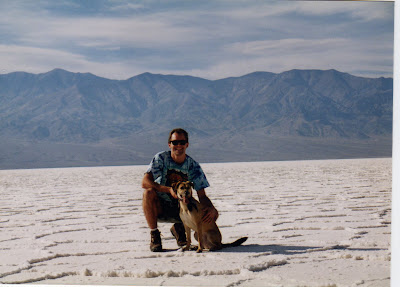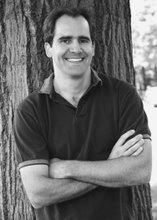 Sarah at the Badlands
Sarah at the BadlandsFirst time I met Sarah in the spring of 1995, she jumped away from me and sprinted out a half open door. I finally caught up with her in a neighbor's backyard a few houses away. Since that moment, she's been my near constant companion and friend, showing an uncommon loyalty and dedication I've never before have witnessed.

Our first big adventure was a cross country trip to Idaho late that same summer. In no particular hurry, we took to the back roads, sleeping at natural forest campgrounds and even out under the stars in empty cow pastures. Despite being August, the nights in the mountains were chilly, and Sarah would climb into my sleeping bag and settle down by my feet. I worried she would suffocate so I would open the bag just a bit at its far end, and she would poke her head out. I found it comical the idea of a two-headed sleeping bag.

That fall, I took Sarah backpacking at the Selway River with some other graduate students from my department. At one spot, an enormous boulder loomed 3 meters above the churning whitewater. We took turns jumping off the rock and into the river. On my second go, I surfaced to see my friend's frantically gesticulating towards the water where to my shock, I saw Sarah furiously dog paddling towards me. She had leapt off a 3 meter rock into furious whitewater to follow me. I grabbed her by the collar and swam hard for the shore before we could be swept over a series of rapids downstream. On shore, and breathless, I hugged her and whispered to her "You crazy, crazy dog. You are amazing!" I knew she was something special.
 The rock from which Sarah leapt
The rock from which Sarah leaptA few years later I was waterskiing at Squam Lake in New Hampshire. As the boat towed me by our dock on Cotton Cove, I saw Sarah's head bobbing in the water at least 100 meters from the shore. She had swum out to follow me while I was waterskiing. I quickly dropped the tow rope and swam over to her. That was Sarah. She could not bear to be apart from me. She always insisted on being next to me on the couch, on the bed and at my feet in the office.
 Sarah in the Virgin River
Sarah in the Virgin RiverSo at least two times she had risked her life to be with me, but she would also save me from risking mine. One spring break, we drove to southern Utah to backpack up the Pariah River. Early in the evening, after I had set up camp, and we hiked up one of the side canyons to the mesa top. There was no trail, just a series of jutting red sandstone ledges haphazardly staggered along the canyon wall. Frequently I had to carry Sarah up a ledge, but within an hour we made it to the top. From there we enjoyed a marvelous view of the Pariah river sweeping down the canyon, as the sun set over the canyon rim to the west.
 At the mesa top
At the mesa topHowever darkness threatened and I did not relish the thought of stumbling down a slot canyon at night. We started making our way down, but I quickly became confused and lost the "trail' we had come up. At one point Sarah refused to continue. I stood at the base of a ledge pleading with her to come so I could lower her to the next level. Increasingly frustrated and anxious about the approaching darkness, I cursed aloud and yelled at her vociferously. But she would not budge. Finally I scrambled back up the ledge and tried to grab her, but she darted out of reach. She continued back up the path we took, ever staying just out of reach, as I cursed her furiously. Suddenly I recognized an odd rock formation and realized I had come the wrong way. I continued to follow Sarah and to my amazement she led us down the correct trail and back to camp. I've often thought that, had continued down the wrong trail, I would have stumbled off a cliff in the night.
 The portal thru which Sarah found our way back
The portal thru which Sarah found our way backSo it was, she followed me in the mountains of the Rockies, on the streets of New York, in the woods of New Hampshire, and the deserts of the Southwest. She shared with me all that is beautiful in this world. And when things were rough, she was there to comfort me.
 In Death Valley
In Death ValleyThirteen and a half years after we first met, Sarah finally succumbed to cancer. For two years and two courses of chemo, she battled valiantly. Our oncologist would marvel at her resiliency, saying Sarah was "amazing" and that she was a "wonderdog". In the end, the cancer could not be stopped. I had hoped for a good death, but I don't know if there is such a thing. Some must be better than others, but in the end, this was harder than anything I've ever done. She lost her appetite, and even steak would not entice her to eat. Soon she was unable to stand on her own, but the hardest part was that she was still lucid and, I imagined, happy to be here. I held her up to drink from her bowl and she wagged her tail vigorously. I knew we needed to say goodbye, but I couldn't let her go.
The next morning at the vet I told her I was sorry.
And now she's gone.
Such a long, long time to be gone and a short time to be here.
Sarah, I miss you terribly.
 Next February 12th will be the 150th anniversary of the publication of the Origin of Species and the 200th anniversary of Darwin's Birthday. Queens College will be celebrating the occasion with a symposium and panel discussion on Friday February 13th in the LeFrak Concert Hall beginning at 9AM.
Next February 12th will be the 150th anniversary of the publication of the Origin of Species and the 200th anniversary of Darwin's Birthday. Queens College will be celebrating the occasion with a symposium and panel discussion on Friday February 13th in the LeFrak Concert Hall beginning at 9AM.  Susan Foster
Susan Foster  Jeffrey Schwartz
Jeffrey Schwartz  Paul Turner
Paul Turner  Patricia Wittkopp
Patricia Wittkopp


















